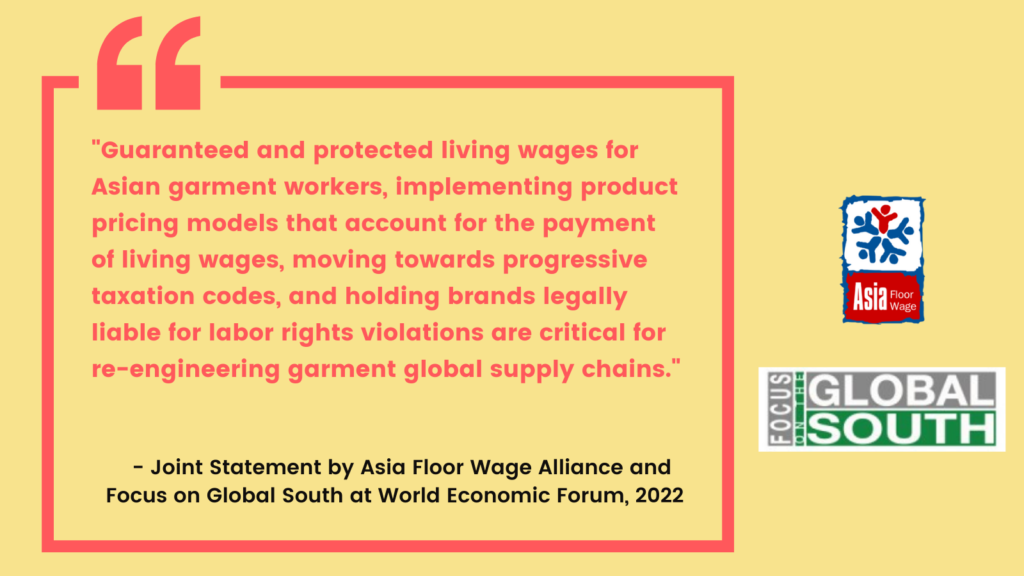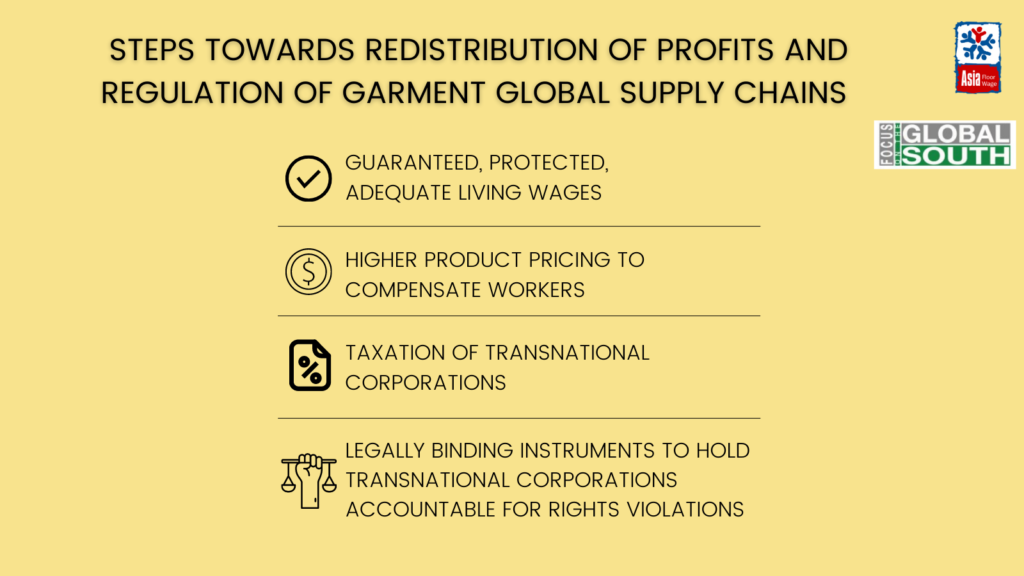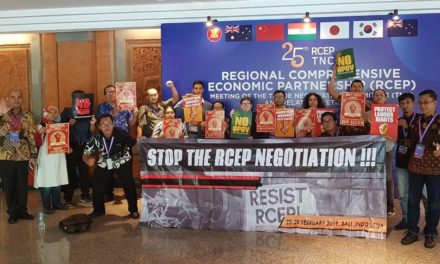
May 26, 2022
Joint Statement released by Asia Floor Wage Alliance (AFWA) and Focus on Global South at the World Economic Forum, 2022
Protecting workers’ rights in garment global supply chains as an important strategy for economic development in the global South
Guaranteed and protected living wages for Asian garment workers, implementing product pricing models that account for the payment of living wages, moving towards progressive taxation codes, and holding brands legally liable for labor rights violations are critical for re-engineering garment global supply chains.
Global supply chains (GSCs) – that account for nearly 70% of global trade[1] – have been shaped and leveraged by transnational corporations (TNCs) that seek to maximize profits while forcing a downward pressure on wages and raw material costs. Under a neoliberal trade regime, developing economies pursue an export-oriented industrialisation model that involves incorporation into global supply chains that are mostly dictated by the requirements of TNCs. TNCs take advantage of the lack of global regulation of supply chains and dispute settlement mechanisms, tax holidays and deduction schemes, that minimize the legal liability for conducting business. This enables them to make exemplary profits at the expense of the lives and livelihoods of millions of workers. Workers are penalised for accessing freedom of association as trade unions are seen as a threat to the neoliberal model of development.
The global garment industry organized through complex garment GSCs is particularly notorious for the mistreatment and underpayment of its workers, even as fashion brands reap extraordinary profits. The garment industry is widely seen as a stepping stone to further industrialisation by developing countries as it is labor intensive with low barriers to entry. Though incorporation into garment GSCs promised industrial development, employment, and decent wages, the industry, steered by the decisions of fashion brands, has failed to deliver on these developmental outcomes for the global South. The garment workforce, predominantly women from marginalized groups, including migrants, religious minorities, and caste-oppressed communities, are forced to accept non-standard forms of employment, with precarious job contracts, as well as low and insecure wages. Brands also do not pay taxes to Asian governments, despite taking advantage of the resources in production regions.
The Covid-19 pandemic and resultant global recession further aggravated pre-existing inequalities and exploitative relationships within garment GSCs. Asian garment workers and garment production countries were forced to subsidize the profits of large fashion brands headquartered in the global North. During the pandemic-induced recession, fashion brands engaged in harmful and unilateral actions to minimize any reduction in profits and safeguard their businesses, such as cancellations of orders, refusal to pay for finished products, and demanding deep discounts. These actions led to severe losses for the Asian garment industry, with several garment factories closing down temporarily or permanently. This in turn resulted in widespread loss of employment and massive wage theft for Asian garment workers – many of them women – who were left without access to work or wages, and consequently, food, shelter, healthcare or education for their children.[2]
The irresponsible business practices by brands also perpetuated informalisation – that further impeded access to healthcare and other social services, increased gender disparities, and exposed workers to occupational and health risks including sexual harassment.[3] Garment workers’ households were pushed far below the poverty line and took on large debts in order to survive – leading to long term and intergenerational transfer of poverty and indebtedness.[4]
Arbitrary decisions by fashion brands worsened the welfare of garment workers and revealed once again the systemic inequalities that undergird garment GSCs.
Towards Redistribution of Profits and Regulation of Garment GSCs
The Asian garment labour movement has identified urgent structural shifts within garment GSCs that can address unequal and exploitative relationships between corporations in the global North and Asian garment workers and production countries. These structural shifts demand a re-distribution of profits down the supply chains and this can be implemented with the following tools:
Guaranteed, protected, adequate living wages: The Asian labour movement has long demanded the redistribution of profits in GSCs through a guaranteed and protected living wage. Whereas Asian suppliers are responsible for statutory and legal minimum wages within the country, brands must contribute, through legally binding mechanisms, to closing the growing gap between living wage and minimum wage. This requires strong labor market institutions which promote union driven and monitored processes for payment of living wages, such as the Wage Forward Campaign for Enforceable and Binding Agreements on Living Wages.
Moving towards higher product pricing to adequately compensate workers: Fashion brands ensure their competitiveness within the fast fashion market by transferring the costs of manufacturing low-cost garments to Asian garment workers in the form of low, insecure and stagnant wages. To ensure fair redistribution of profits, a global readjustment towards higher prices by consumer markets and brands through a pricing model that enables adequate compensation is needed.
Taxation of transnational corporations: In lower income countries tax revenue is more urgently needed due to lower per capita national incomes and a smaller percentage of national incomes converted to government revenue compared with developed countries. Despite this, TNCs drive developing economies to compete for investment by offering tax incentives, accelerating the race to the bottom. This harmful tax competition diverts potential revenue from where it is urgently needed, leaves developing countries more vulnerable in times of crisis, and belies sustainable recovery. To mitigate this, fashion brands must contribute to public spending on workers’ welfare and social security in production countries.
Legal Paradigm for Brand Accountability: Asian garment workers and their trade unions are attempting to build a legal paradigm within garment GSCs that places the highest form of accountability on fashion brands, as joint employers of workers. Through these litigation efforts, the Asian garment labour movement demonstrates that brands set the terms and conditions of their employment, including access to work, secure contracts and adequate wages, and should, therefore, be held liable as joint employers of workers. They have also highlighted that governments in Asian garment producing countries have the capacity to regulate garment GSCs by applying existing labor protective legislations in the context of outsourcing and offshoring of production by fashion brands.
Corporate Accountability and Human Rights: An important process that supports litigation efforts at the national level and strengthens the legal paradigm towards stronger corporate accountability at the international level is the negotiations at the United Nations towards a legally binding instrument to hold transnational corporations and other business enterprises accountable for human rights violations. The question of legal liability is being tackled in these negotiations, and civil society organizations like the Global Campaign are pushing States to provide for the civil, administrative and criminal liability of TNCs established in their territory regardless of the place where they have caused or contributed to the violations through their global production chains.”[5]
We urge the World Economic Forum to acknowledge that garment GSCs rests on fundamental power asymmetries that can only be corrected by strengthening labour protective policies and frameworks. Guaranteed and protected living wages for Asian garment workers, implementing product pricing models that account for the payment of living wages, moving towards progressive taxation codes, and holding brands legally liable for labour rights violations are critical for re-engineering garment GSCs. We can no longer afford to leave the lives and livelihoods of garment workers to the whims of global fashion brands. The world economy must be built not on the institutions of profit-making that caused an unprecedented socioeconomic crisis during a pandemic but must be based on respecting the dignity and humanity of workers.

[1] https://www.oecd.org/trade/topics/global-value-chains-and-trade/
[2] https://asia.floorwage.org/covid/money-heist-covid-19-wage-theft-in-global-garment-supply-chains/
[3]https://focusweb.org/grey-economy-and-sickly-recovery-informal-women-workers-in-pandemic-ravaged-philippines/
[4] https://asia.floorwage.org/covid/money-heist-covid-19-wage-theft-in-global-garment-supply-chains/
[5] Global Campaign comments to the 3rd Revised Draft, September 2021







